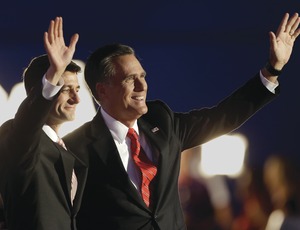
News Analysis: A Mitt Romney administration would knock down regulatory hurdles that get in the way of contractors and depart from President Obama's policies on labor and taxes. But how much a Romney administration would cut transportation and water infrastructure spending remains something of an open question, several sources say.
"I don't think anybody knows. The truth of the matter is, there is not a specific plank in either candidate's platform" for transportation funding, says Dave Bauer, senior vice president of government relations for the American Road & Transportation Builders Association (ARTBA). Bauer says the next transportation secretary—and what he or she says during confirmation hearings—will offer the best clue as to winning candidate's priorities in that sector.
By tapping Rep. Paul Ryan (R-Wis.), a budget hawk, as his running mate, Romney is signaling voters that the next federal budget debate could be a loud one.
Although Ryan typically supports spending cuts, his views on the Highway Trust Fund and transportation investment don't necessarily reflect an animosity toward transportation projects, Bauer says. In fact, Ryan's extended family has run Ryan Inc. Central, an excavation, foundation and site development contracting company in Janesville, Wis., for decades. (Ryan himself spent only one year working on marketing for the firm in the 1990s.)
 |
"Certainly, [ARTBA] opposes any effort to cut investment in highway and public transportation funding, but his budgets were a reflection of the trust fund's reality," Bauer says. Ryan does not want to spend more on transportation projects than the fund could support, he says.
Romney's record as a governor and Obama's record as president and as a state and U.S. senator provide clues about their future priorities. "As governor, Romney had a lot of hands-on experience with infrastructure," Bauer says.
Robert Brustlin, CEO of Vanasse Hangen Brustlin Inc., a Watertown, Mass., transportation engineering firm, recalls a different man. As Massachusetts governor, Romney faced budget problems in 2002 after the dot-com implosion sent his state and others in the Northeast reeling. "Rather than recognize that infrastructure spending is different from other spending—in that it is investment in the future, not just spending—he cut budgets across the board," Brustlin says. "Almost all new transportation projects stopped for his four-year term while he tried to balance the budget."
Brustlin believes Romney would act in a similar fashion as president. "He will be facing enormous financial challenges with federal deficits. If he is true to form, we can expect that, once again, he will not differentiate between spending and investing, and he will cut wherever he can. That suggests to me a long, dry period for infrastructure investment as the federal budget is not likely to become flush quickly."
James Johnston, a division president of consultant Birdsall Services Group Inc., Cranford, N.J., notes “the appalling lack of specificity on details during the campaign so far. Other than saying generalized statements about getting people back to work, there has been little discourse of substance.”
He says he is concerned about the candidates’ “apparent disinterest" in promoting the energy efficiency and renewable energy areas. "These services have been one of the few bright spots for our firm and others and to eliminate or reduce some of these programs would have a dramatic effect on our profession,” says Johnston.
“While not entirely successful in execution, the Obama administration has shown a commitment to infrastructure in this country and the President has repeated that mantra many times," Johnston adds. "I (and others) cannot ascertain how the Romney/Ryan budget (cut domestic spending/no tax increase/increase military spending) cannot have a chilling effect on investment in our infrastructure and our goal of energy independence.”
Romney's stands on high-speed rail and support of the Highway Trust Fund also are suspect.
One construction industry source, who asked not to be named citing company policy on commenting publicly about these matters, says the GOP platform seems to be critical of high-speed rail—something Obama strongly supports—and using a vehicle-miles-traveled or miles-based user-fee system as an alternative or supplement to gas taxes to support the Highway Trust Fund. The industry official says, "I think [high-speed rail] is potentially an incredible growth market" for the engineering and construction industry.
On the other hand, the source adds, "There were issues in the Republican platform that were very positive," such as greater reliance on public-private partnerships, environmental streamlining and expediting projects.
In his Aug. 30 speech at the Republican convention accepting the party’s nomination, Romney said that, if elected, he and Ryan “will champion small businesses, America's engine of job growth.” Romney said the plan would include reducing taxes on businesses, repealing the Obama-backed health-care law and “simplifying and modernizing the regulations that hurt small businesses the most.”
Scaling back regulatory overreach is the one thing most construction industry officials agree about a potential Romney administration. Jeff Shoaf, senior executive director of government affairs for the Associated General Contractors of America, says the "regulatory overkill" under Obama would "not exist" under a Romney administration on issues such as construction-site stormwater runoff.
Also, plans to stiffen regulations likely would be scaled back, and some Obama directives would be softened.
As the potential "deregulator in chief," Romney is a nightmare for environmentalists. David Goldston, NRDC Action Fund director of government affairs, says the positions that Romney and Ryan have been taking on regulations "are, frankly, about as extreme as could be imagined." He says they have raised questions about particular air and water standards. Moreover, he says Ryan voted for "fundamental changes in the regulatory system that would basically make it next to impossible to issue any additional air-pollution limits [or] other kinds of standards."
Another area expected to be starkly different if Romney were elected is labor. Geoff Burr, vice president of government affairs for the Associated Builders and Contractors, which endorsed Romney in February, says he expects Romney, if elected, to issue an order barring project labor agreements on federal projects on Day One. Romney also would make changes at the Labor Dept. to ensure the wage surveys used to determine the prevailing pay rates are more accurate, he says. Romney would maintain the Bush-era tax cuts and eliminate estate and alternative minimum taxes, Burr says. All these moves would benefit ABC member firms, 80% of which qualify as S-Corporations, and other entities taxed at the individual rate, he says.
"In talking with contractors that are looking at putting bids on work, they're not sure what their tax rates are going to be, and that has a huge impact on their bottom line," Shoaf says. "I just don't feel … the Obama administration understands that as much as Romney seems to."







Post a comment to this article
Report Abusive Comment